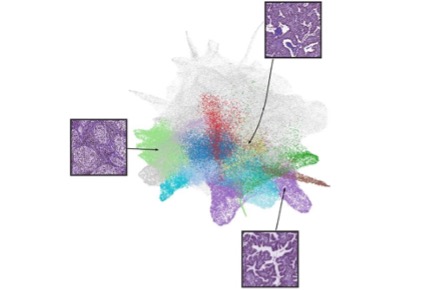Self-Taught AI Tool Diagnoses and Predicts Severity of Common Lung Cancer
June 14, 2024
Source: drugdu
 457
457

A computer program powered by artificial intelligence (AI) and trained on nearly half a million tissue images can effectively diagnose cases of adenocarcinoma, the most prevalent type of lung cancer.
The computer program developed and tested by researchers at NYU Langone Health (New York, NY, USA) provides an unbiased, detailed, and reliable second opinion for patients and oncologists regarding the presence of the cancer and the possibility and timing of its return, also known as its prognosis. This is because the program incorporates structural features of tumors from 452 adenocarcinoma patients, who are among the more than 11,000 patients in the U.S. National Cancer Institute’s Cancer Genome Atlas. Importantly, the program operates independently and is "self-taught," deciding by itself which structural features are most critical for assessing the severity of the disease and its impact on tumor recurrence.
In their research, the algorithm, known as histomorphological phenotype learning (HPL), successfully differentiated between adenocarcinoma and similar types of lung cancer, such as squamous cell cancers, with 99 % accuracy. The HPL program also demonstrated a 72 % accuracy rate in predicting the likelihood and timing of cancer recurrence after treatment, surpassing the 64 % accuracy achieved by pathologists who analyzed the same tumor images manually. The research team envisions that, with continued advances in understanding lung cancer biology, pathologists will increasingly review tissue samples on their computer rather than through traditional microscopy and will employ their AI program to further analyze and visualize these scans.
The researchers aim to use the HPL algorithm to assign each patient a score from 0 to 1 that reflects their statistical probability of survival and tumor recurrence for up to five years. They emphasize that the self-learning nature of HPL means the program's accuracy will improve as it processes more data over time. The team is now looking to develop similar AI-based programs for other types of cancer, such as breast, ovarian, and colorectal cancers, which will also incorporate key morphological and molecular data. Plans are also underway to enhance the precision of the adenocarcinoma HPL program by integrating additional data from hospital electronic health records, including information on other illnesses, diseases, income levels, and residential zip codes.
“Our new histomorphological phenotype learning program has the potential to offer cancer specialists and their patients a quick and unbiased diagnostic tool for lung adenocarcinoma that, once further testing is complete, can also be used to help validate and even guide their treatment decisions,” said study lead investigator Nicolas Coudray, PhD, a bioinformatics programmer at NYU Grossman School of Medicine and Perlmutter Cancer Center. “Patients, physicians, and researchers know they can rely on this predictive modeling because it is self-taught, provides explainable decisions, and is based only on the knowledge drawn specifically from each patient’s tissue, including such features as its proportion of dying cells and tumor-fighting immune cells and how densely packed the tumor cells are.”
Source:
https://www.labmedica.com/pathology/articles/294801500/self-taught-ai-tool-diagnoses-and-predicts-severity-of-common-lung-cancer.html
Read more on
- China Sino Biopharmaceutical Signs Exclusive Licensing Agreement with Sanofi for Rofalcitinib March 4, 2026
- Gan & Lee Pharmaceuticals’ new PROTAC drug GLR2037 tablets have been approved for clinical trials to enter the field of prostate cancer treatment March 3, 2026
- AideaPharmaceuticals plans to raise no more than 1.277 billion yuan through a private placement to focus on the global clinical development of innovative HIV drugs March 3, 2026
- Giant Exits! Its Star Business Acquired March 3, 2026
- Focusing on cardiovascular and cerebrovascular diseases! OpenMediLead Medical Intelligence Dual Engines Launch Internal Testing, Connecting Drug Development and Clinical Diagnosis in a Closed Loop March 3, 2026
your submission has already been received.
OK
Subscribe
Please enter a valid Email address!
Submit
The most relevant industry news & insight will be sent to you every two weeks.



